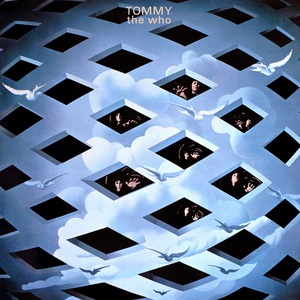This is a big topic, and if I wanted to invite the kind of drama that inevitably comes with the discussion of controversial issues, there's a heck of a lot I could say about it. But, while I love a healthy debate, I know that in the online world debates can turn nasty in a hurry, and I don't need all that nastiness in my life, so I'm going to steer clear of some of the more troubling facts associated with globalization's impact on culture. If you want to read more, just google it. Plenty of people have taken the time to share their thoughts on the subject.
My focus is going to be on one tiny way in which this issue has impacted my own life. And, as I said, it's tiny. Miniscule. Hardly a blip on the cultural appropriation radar. And that's where I want to keep it. Like I said, I love a good debate but hate all the drama that goes along with it. So I'm avoiding the drama.
A Transatlantic Christmas
Last week's post was about the movie Tommy and its impact on my childhood. I mentioned that I watched the movie so many times when I was very small that I almost feel like I've been to some of the locations shown, even though I've never visited England. Well, there was one scene in particular that confused me when I was growing up. I suppose it was so very English that my little American brain couldn't quite process it. Here's the scene in question:
Wanna know what confused me so darn much? Well...do you see those paper hats they're all wearing? Do you know what those are? If you're English, of course you know what those are. If you're American you might, but then again you might not. If you're American, you may be just as confused as I was watching this movie as a tiny tyke.
For those of you who may not know, the hats come out of Christmas crackers. What's a Christmas cracker? It's a little thing that looks like this:
If you want to read about their history, follow this link. When you pull a Christmas cracker apart it makes a popping sound and a few goodies fall out of it. They are famous for containing cheap toys, corny jokes, and paper crowns. It's the paper crowns you see in the scene from Tommy, though I've never gotten a crown that fancy from an actual Christmas cracker. One must assume those were custom made for the movie.
Okay, so I watched Tommy all my life and never understood why people were wearing paper hats in the Christmas scene. But then there was a lot I didn't understand about Tommy, so I chalked it up to typical Ken Russell weirdness.
I reached my twenties without knowing anything about Christmas crackers. After all, the only place I had seen the little hats was in what was arguably a very strange movie, so I just assumed that was the only place they existed. Then I saw the movie Billy Elliot. I tried to get a picture of the Christmas scene from that movie, but couldn't find one. But I think you know what I'm going to say about it. If you guessed that Billy and his family are all wearing paper hats while enjoying their Christmas dinner, you'd be correct.
So. My interest was officially piqued. What were these funny hats English people liked to wear during the holiday season? I needed to know, and because I now had access to the internet--a luxury which was unavailable when I was growing up--I was able to find out. And once I found out, I just had to order a box of crackers to open with my husband on Christmas morning. And, again, because of the internet I was able to do just that.
Wanna know something strange? Since I've started buying Christmas crackers (they've been a yearly tradition in our home for about seventeen years now) I've begun to see them everywhere. Yes, there have been a few years when I've had to order them online because I couldn't find any in the stores near my house. But sometimes I do see them. One year I bought them from Sears. Last year I got them at World Market. I actually remember one year, when I was teaching elementary school full time, one of the teachers at my school bought about three boxes of them and gave them out to her class on the last day before Christmas break.
The Death of Cultural Identity?
So...if Americans know what Christmas crackers are and even open them during their Christmas celebrations with their families, does that mean they are no longer an English tradition? Is it weird that my very American children have opened them every year for as long as they can remember? That they look forward to reading the cheesy jokes and laughing at the lame toys? That they say they'll never wear the hats because it's just too embarrassing, but will still put them on for a least a couple of seconds while we're opening presents on Christmas morning? Is it a little sad that, by bringing this tradition into my own home, I've made it somewhat less quintessentially English than it used to be? Is it sad that my children will never watch Tommy or Billy Elliot or any other English movie which takes place at Christmastime and wonder why everyone is wearing paper crowns? Is it sad that they will never associate the paper crowns with England and English culture because they've grown so accustomed to the tradition in their own home?
Have I committed a grave act of cultural appropriation? Is this why people are so concerned about cultural appropriation? Because if we blend all cultures together, pretty soon there will be no cultural distinctions left?
Or should I just stop worrying, put on my paper crown, and enjoy my Christmas?
















